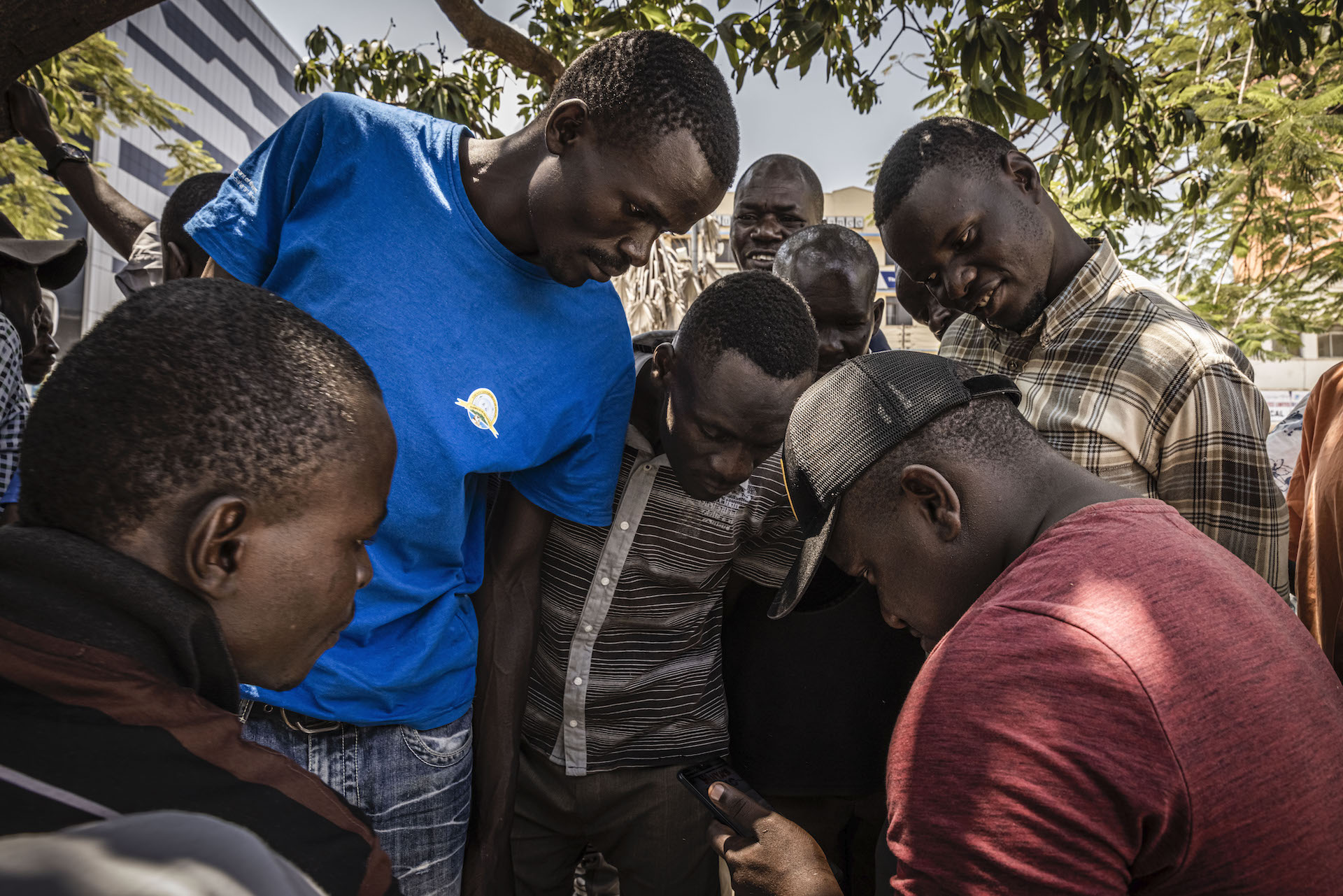
Men look at their phones on August 11, 2022 in central Kisumu, Kenya. Kenya is one of fintech's greatest growth markets.
Photo: Ed Ram/Getty Images
The fintech sector in Africa is the only VC market posting double-digit growth this year — at a time when the rest of the global VC market has been slowing down.
According to Ashlin Perumall, partner at Baker McKenzie in Johannesburg, the strong inflow of capital is due to Africa’s rapidly growing user base and better internet access across the continent.
PERUMALL: The African fintech environment has reached an inflection point which was particularly noticeable in 2022. Whilst the rest of the world in Q1 and Q2 was experiencing a slowdown in venture capital funding, African fintech was expanding and also holding fast in terms of fairly serious valuations.
Part of this is due to the growth of supporting industries around fintech, and that includes the telecoms industry, the penetration of mobile devices across the continent, but also the appetite of African consumers as they move up the value chain. There is a greater appetite for wider financial resources and a much bigger user base than in recent years.
Africa has hit that point where it’s being taken seriously, not just by investors on the African continent, but also by offshore investors coming out of the West Coast U.S., the U.K., and some parts of the APAC region. That influx of capital has both had an environmental effect — many of the fintechs who have been successful have been regional players — and I think that has also added to the appetite for international investors to come on board.
BRINK: Where is the investment capital coming from? Is it largely the U.S.? Is it European?
PERUMALL: It depends on what stage funding we’re talking about. When it comes to fintechs that are relatively young, so pre-seed or seed-stage funding, it’s almost equal between funding onshore, that’s African funding, and offshore funding coming from North America, and then to a much smaller degree, the Middle East, Mediterranean area, and a smaller percentage of Europe and a very small slice of that coming out of the Asian regions.
When you get to the growth stage, so series C and D, that’s when we see the North American, particularly West Coast, funding take over as more than half of the source of funding. By and large, series C and series D funding is coming from the U.S.
Payments Are Seeing the Greatest Growth
BRINK: What are the most promising areas in the sector?
PERUMALL: The biggest growth has been in payments. This includes, for example, mobile wallets, cross-border payments and remittances and third-party payments providers. I would say more than a quarter of the fintech market is the payments space.
For example, Senegal recently had a massive funding round for one of its largest fintechs, which has now reached unicorn stage, showing that payments still has room for growth in Francophone Africa.
What I would see coming up next would be peer-to-peer lending, that is lending between intermediaries without necessarily having a bank or another financial institution being part of the mix. You would be providing platforms where individuals can seek loans from other individuals with capital and the creation of platforms to allow for those kinds of lending opportunities. The lending space is one that has a lot more headroom to grow.
It really has brought about revolution in terms of what households are able to achieve with their economic wealth and the financial services they’re able to access
Another area that is untapped at this stage are digital banks, i.e., non-brick and mortar digital banks or neo-banking. We’ve seen that growth in Southeast Asia and Singapore, but in Africa not so much. There is a lot of opportunity, I think, still on the table for new digital banks to start emerging on the African continent.
Insurtech Starting to Take Off
Another area that is also quite relevant, although definitely not yet as large, is insurtech. Up until now, insurtech in Africa has been a case of current incumbent insurance providers digitizing the provision of insurance products, including aggregated insurance — so insurance products, not just for your vehicles but also for your home and other assets now being aggregated under single providers.
Then there are the relatively new point-of-sale insurance providers. These are insurance products being offered, for example, at e-commerce point-of-sale targets and also short-term insurance at point of sale. There is a lot more growth in some of these other pillars as well.
Social insurance is a new innovative business model that is coming up in Africa in the insurance industry. It involves being able, as a small institution or individual, to participate in the insurance industry by providing staked capital for those insurance products, and then that being provided to users on the other end via social platforms that have been created.
The Network Effect Is Raising Living Standards
BRINK: Presumably all of this ecosystem that you’re describing could have a transformational effect on economic development in Africa?
PERUMALL: Kenya, for example, about 10 years ago, had a penetration in respect of banked individuals and banked adults of about 26%. Thanks to the fintech that emerged in their country, which used the telecom infrastructure to provide for banking opportunities and payment opportunities, without even having a data connection, banked financial inclusion has gone up to 83%.
The ability of fintechs to allow you to save money, to resource money and retain money allows for other economic factors to come into place. These could be financial products like investments, better opportunities for growing savings and deposits, or more financial products outside of consumer-based uses of these payment systems.
The network effect of that is that it allows individuals to grow economic wealth per capita, grow the opportunities per household and access more resources, access more services that would previously have been possible. I was at a recent conference where it was commented that every single household should be given a cell phone as a means of service delivery because of the impact that it has based on what the fintech economy has created on the African continent.
It really has brought about revolution in terms of what households are able to achieve with their economic wealth and the financial services they’re able to access that they would not have been able to access had it not been for these innovations.
BRINK: Which countries have the greatest growth potential in fintech?
PERUMALL: I would say that the geographic hotbeds are the bigger economies, so South Africa features high on the list. Almost double its size in terms of venture capital rounds would be Nigeria. I think Kenya is close behind and then Egypt, and those are the lion’s share of the fintech market.
The rest of Africa, I would say, contributes about as much as those four countries. But others would include Ghana, Senegal being a Francophone country coming online. Then, to a much smaller degree, countries like Ethiopia. I would say that a real shift at the moment is to non-Anglophone countries as new sources of investment.
And if you look at Africa on a regional basis, there are huge markets. The challenge is the lack of portability of your licenses and your workforce. For example, if you’ve got Kenyan fintech experts that you have to have in Angola, you would need to move those experts between jurisdictions.
If that can be unlocked and we can get more harmonization between the different licensing and economic regimes that underpin some of the fintech players’ compliance obligations, then you could unlock broader markets. That would immediately make fintech cases much more palatable in the long term. That’s where we are going to see the greatest potential, as the African Continental Free Trade Agreement starts to come into life.






